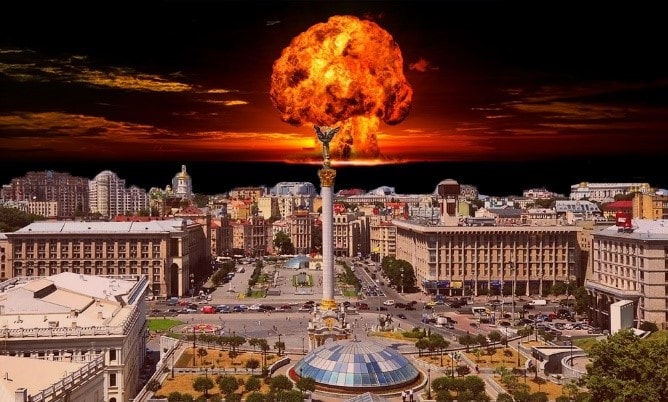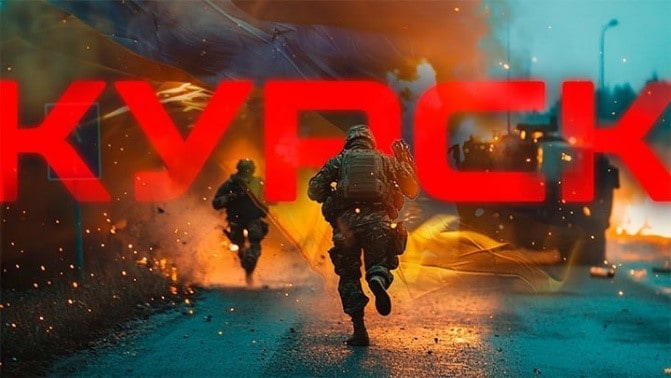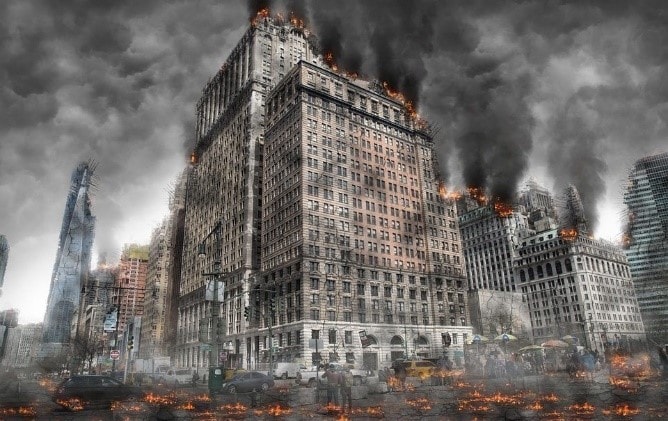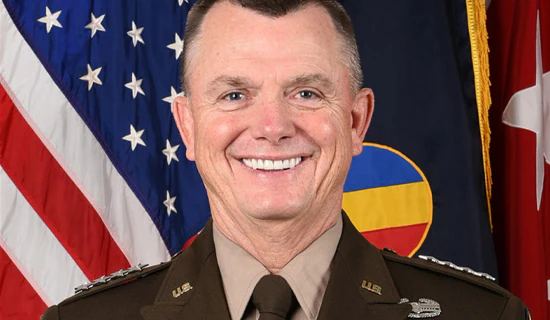On August 6, 2024, the Armed Forces of Ukraine launched an incursion into Russia's Kursk Oblast. The day after, on August 7, Russian businessman and founder of the pro-Kremlin media outlet "Tsargrad" TV channel, Konstantin Malofeev, in an article, titled "How Much Longer?" called for the use of Russia's nuclear weapons. "We are able and must deliver a truly potent retaliation strike in a way that will force the West to curb a support of Ukraine and, consequently, will put an end to the SVO [Special Military Operation, war in Ukraine]," wrote Malofeev, adding that "it is high time for Russia's tactical nuclear weapons – it must become the weapon of victory."[1]
Pro-Kremlin Website Bloknot.ru Warns Of A "Tactical Nuclear Strike" On Kyiv
On August 8, the pro-Kremlin website Bloknot.ru wrote that 77 percent of its readers had voted for a tactical nuclear strike on the capital of Ukraine as a response to the invasion of Russian territory. The media outlet warned that attacks on "on critically important military facilities" (such as strikes on strategic bombers, the S-400 air defense missile shield installations, and nuclear missile launch early warning stations) would lead to a nuclear response. Furthermore, it stated that "the Ukrainian Armed Forces are rushing to the Kursk Nuclear Power Plant, if they capture it, we could be talking about a real nuclear threat to Russia."[2]

(Source: Bloknot.ru)
Bloknot.ru also quoted Russian political scientist Sergei Starovoitov, who stated that had Ukraine crossed "a major red line" when it sent troops into the Kursk region, and that Russia's "defense doctrine implies the use of nuclear weapons as a response to direct aggression from a foreign state."[3]
The Russian media outlet went on to say that if a nuclear charge of about 50 kilotons were to hit the center of the capital of Ukraine, the radius of total destruction would be two kilometers, while that of "partial and total burnout" would be 12 kilometers. "The approximate number of victims (considering the density of the city's population) from the nuclear explosion alone is 300,000 people. Of these, about a quarter, i.e. 75,000, would children. Approximately the same number would die in the next month from the effects of penetrating radiation and radioactive contamination. If a 100-kiloton bomb were to hit, the total number of victims in the first minutes would be over 500,000, of which 125,000 would be children."
Bloknot.ru then added: "Yes, the Americans once calculated what would happen to Kyiv if Russia struck it with a super-powerful ballistic missile with a 100-megaton warhead. It is hard to say whether we have one or not. But it is known that the Poseidon unmanned underwater vehicle is capable of bringing down such power. So, this strike would wipe out everything within a radius of 65 kilometers, and even Belarus would be in the secondary destruction zone. The U.S. estimated the death toll at the time of the explosion at 2.5 to three million... The epicenter of the nuclear explosion would be the Saint Sophia Cathedral, a temple-museum built by order of Yaroslav the Wise in the 11th century and included in the UNESCO heritage list."[4]
Bloknot.ru then argued that the US would not "stand up" for Ukraine in the event of a Russian nuclear strike on Kyiv: "Washington does not intend to get involved in a conflict in which their cities will also be destroyed."[5]
Levada Center: 91 Percent Of Russians Worried About Ukraine's Incursion In Kursk
The Levada Center, a Russian independent nongovernmental polling and sociological research organization, features a monthly poll on Russian opinion about the war. In August, after the Ukraine launched the incursion in Kursk, the level of support for the actions of the Russian armed forces in Ukraine was around 78 percent (43 percent "definitely support" and 35 percent "rather support"). A total of 17 percent of Russians do not support it (seven percent definitely not, nine percent rather not). It is worth noting that, on August 30, 2024, the share of respondents in favor of the continuation of hostilities increased, reaching almost 41 percent. Almost 91 percent all respondents were concerned about the attack by the Ukrainian armed forces on the Kursk region (of this 91 percent, 63 percent declared themselves "very worried", and 28 percent said they were "rather worried"), nine percent of respondents said they were not worried about these events. The main reasons for concern among Russians are "civilian casualties" (41 percent), "attack on the territory of Russia" (25 percent), and the "weakness and unpreparedness of the authorities" (11 percent).[6]
In June 2024, before Ukraine launched the incursion into Kursk, the share of Russians who believed that Russia's use of nuclear weapons in the current conflict could be justified was about 34 percent, with 10 percent of respondents stating that they "definitely" supported a nuclear strike on Ukraine, while another 24 percent said it was "rather/maybe" appropriate.[7]

(Source: Tsargrad.tv)
Malofeev: "We Are Able And Must Deliver A Truly Potent Retaliation Strike"
Commenting on the recent news that the U.S. is thinking of allowing Ukraine to strike Russian territory with long-range missiles,[8] Russian businessman and founder of the Pro-Kremlin media outlet "Tsargrad" TV channel, Konstantin Malofeev, wrote: "In the West... they have forgotten about Russian strength and spirit. They have become accustomed to a tamed country. The over-played Satanists in the U.S. should experience the consequences of the popular expression 'whacking [terrorists] in the outhouse' [a famous Putin quote]. And if they do not understand, then we should remind them that 'they will simply die' [another Putin quote]."[9]
Below is Malofeev's article, which he published on August 7, the day after Ukraine launched the incursion into Russia's Kursk Oblast:[10]
"War has come to the Kursk Oblast. [I am talking] no longer about a shelling or a saboteur's raid, but a planned army operation to seize strategically important equipment and territory, orchestrated in Kyiv and approved in Washington.
"The enemy seized control of more than a dozen settlements. On the way to their objectives, the ZSU [Armed Forces of Ukraine] spared neither women, children, medics, nor sacred places. The enemy targeted the temples of the Gornal male monastery and Orthodoxy [itself], which has united the Russian world for centuries.
"The Nazis from the ZSU have no chance of success. Russia knows well what it is like to defeat the Nazis at Kursk. However, the local success evidently has encouraged Kyiv, which means that such offensives will be repeated. The red line has once again been crossed, the population and infrastructure of the Central Russian regions of our country are in danger. We have no right to abandon our own [people] in a calamity.
"We are able and must deliver a truly potent retaliation strike in a way that will force the West to curb a support of Ukraine and, consequently, will put an end to the SVO [Special Military Operation, war in Ukraine].

(Source: Bloknot.ru)
"It is high time for Russia's tactical nuclear weapons – it must become the weapon of victory. The [Russian] military command will determine the exact point of strike, provide the civilian population 48 hours [to evacuate] and, finally, will end this war.
"History is completing another circle.[11] Seventy-nine years ago in the days of August, the Americans held a demonstration of their nuclear power over peaceful Japanese cities[12] and, thus, ended World War II. Today a demonstration of Russian nuclear power over military and infrastructure facilities should prevent World War III."
[1] Tsargrad.tv/slovo/nu-skolko-mozhno_1037701, August 7, 2024.
[2] Bloknot.ru/v-mire/yadernyj-udar-po-kievu-kakimi-budut-ego-posledstviya-1324047.html, August 8, 2024.
[3] Bloknot.ru/v-mire/yadernyj-udar-po-kievu-kakimi-budut-ego-posledstviya-1324047.html, August 8, 2024.
[4] Bloknot.ru/v-mire/yadernyj-udar-po-kievu-kakimi-budut-ego-posledstviya-1324047.html, August 8, 2024.
[5] Bloknot.ru/v-mire/yadernyj-udar-po-kievu-kakimi-budut-ego-posledstviya-1324047.html, August 8, 2024.
[6] Levada.ru/2024/08/30/konflikt-s-ukrainoj-i-napadenie-na-kurskuyu-oblast-osnovnye-pokazateli-v-avguste-2024-goda/, August 30, 2024.
[7] Levada.ru/2024/07/04/konflikt-s-ukrainoj-osnovnye-indikatory-otvetstvennost-povody-dlya-bespokojstva-ugroza-stolknoveniya-s-nato-i-primeneniya-yadernogo-oruzhiya/, July 4, 2024.
[8] Politico.com/news/2024/09/11/white-house-weapons-ukraine-00178673, September 11, 2024.
[9] Tsargrad.tv/news/dalnobojnymi-raketami-po-rossii-zaigravshimsja-v-ssha-pripomnili-zhestkoe-obeshhanie-putina_1052617, September 10, 2024.
[10] Tsargrad.tv/slovo/nu-skolko-mozhno_1037701, August 7, 2024.
[11] A poetical and philosophical concept, quite common in Russia, according to which social development and history corresponds to certain cycles, or "moves" in spirals.
[12] Malofeev refers to atomic bombings of Hiroshima and Nagasaki on 6 and 9 August 1945.




